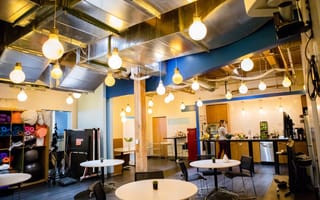
SPINS is a company that believes in roles, not jobs.
That gives engineers the chance to try their hand at new skills. One engineer was able to work on dev ops. Others are encouraged to pursue their professional interests and passions, whether that’s conducting research or solving problems in new and unique ways.
“I’ve worked at plenty of places where things kind of stagnate and people work on the same things for years and years,” said senior software engineer Jeremy Dimond. “That’s not the case at SPINS. There’s a constant chance to learn and develop your skills.”
SPINS’ engineers can’t afford to let their skills stagnate because the industry they’re in is constantly evolving.
Founded in 1995, the company says its mission is to get more natural and organic products on store shelves. Since then, SPINS has gathered massive amounts of data on products in this $155 billion market, providing analytics and insights.
We recently met with the engineering team to learn how the company manages petabytes of data and supports employees’ wellbeing, personally and professionally.

SPINS AT A GLANCE
EMPLOYEES: 213 nationally, 165 in Chicago.
WHAT THEY DO: Provide analytics and insights for the consumer packaged goods industry, focusing on natural and organic food along with wellness products.
WHO THEY DO IT FOR: Manufacturers, brands and retailers, as well as VC and private equity firms that want to better understand the natural and organic products marketplace.
NO SURPRISE HERE: The kitchen is filled with natural and organic food. Good luck finding a soda.
(COOKING) CLASS IS IN SESSION: A designated team organizes activities to promote a healthier lifestyle, like chef-led cooking demos, yoga and personal training at the office gym.
BY THE NUMBERS: SPINS’ product library contains information on over 2 million products, with 10,000 new items added monthly. They also track sales data from 106,282 stores around the United States.

You work with a range of consumer packaged goods brands. How do they use SPINS?
Deepika Duggirala, VP of engineering: Natural and organic food brands leverage SPINS’ analytics to show grocery stores that their products are driving sales. This leads to stores stocking more of these healthy products, which in turn leads to more choices for consumers.
You’re tracking product and sales data in one of the fastest-growing segments of the CPG industry. What challenges does this present?
Jeremy Dimond, senior software engineer: Our team has had to handle a rapidly increasing amount of data. This data needs to be married with our proprietary product library and published in a way that can be consumed by the team that builds our customer-facing application. Working with this much data means we’ve had to develop processes that are automated and more scalable.
Mike Schiro, lead architect: When you work with petabytes of data, another huge challenge is accuracy. That’s super important to us as a company, especially when it comes to the attribution of products. Our clients need to be able to trust us when we say something is non-GMO or gluten-free.
Janice Yee, senior software engineer: One thing we’ve continually worked on is how to better share data across teams. We’re trying to centralize all of the data we work with, instead of having it coupled to certain projects and teams.

Can you tell me about a project the engineering team recently completed?
Schiro: We went through a pretty major transition over the past year when we migrated our product library from an older legacy platform to a new cloud-based solution. It increased the speed at which we can view and export information and has also made maintenance easier.
One of the big challenges we faced was building out the team as the project was underway. We went from two developers working part time on this project to 10 people working full time. Building out that team was challenging and a really nice experience for me personally.
What does SPINS look for in engineers?
Dimond: We don’t expect people to have experience with every piece of tech we use. We look for people who can demonstrate an understanding of the technology they have worked with, along with a real desire and passion for learning new technologies.
Schiro: One thing I look for right off the bat is that passion. You can tell when someone is super excited to talk about what they’ve worked on, whether it’s a giant project or a bug fix. That’s the type of person we want on the team, someone who cares about the work they’re doing and is having fun at the same time. That attitude is contagious and it makes our team better.
Duggirala: We look for a desire to understand the business of SPINS along with creativity and out-of-the-box thinking. We also value people who enjoy rolling up their sleeves and getting things done.

How does SPINS set up engineers for success?
Subha Adusumalli, engineering manager: We have an open environment. There are no high walls here. We encourage collaboration, whether it’s through peer programming or just offering to help someone solve a problem they’re stuck on. There’s active communication among all the engineers.
Dimond: SPINS is definitely not afraid to try new things and to push boundaries. There’s a forward-looking attitude here.

Has the company’s mission to help people lead healthier lives shaped the culture here?
Schiro: SPINS has a very mission-driven culture, which to me was one of the most exciting things about joining the company. We give back through a lot of community events like food drives and volunteer work. On a weekly basis, employees have access to things like yoga, massages and personal trainers.
We have a great in-house team that comes up with awesome events for employees — like happy hours with healthy cocktails and cooking demos. I’ve worked at startups in the past that were more focused on drinking, but there’s more to creating a culture than just that.
Dimond: I don’t think I’ve ever worked at a company that invests as much in having so many fun and interesting activities. I was talking to my wife about them and she asked me, “Do you guys ever work?”
Yee: It’s nice to come into work every day and know that the company cares not just about what you do but how they can help you lead a healthier life.


Name something you like about working on the engineering team.
Adusumalli: You get to understand the full end-to-end process. You’re not siloed in one area, which can be the case at some other companies. Engineers can move into other areas that interest them, whether that’s solving new problems, conducting research or something else.
Yee: I really love the organic feel of this company. If you’re willing to put in the time, work hard and are passionate, you have the chance to do so much more than code. For example, I’ve been able to get into dev ops. At some other companies I wouldn’t have the chance. I’d just be coding and that’s it. But here I get to touch so many different parts of the business, and that’s really rewarding.
Duggirala: Everybody is really good at what they do and really passionate about what they’re working on. This is where you’ll hear pride in my voice, because I really do think that I work with an amazing group of people. It’s really cool to come in every day and watch them do their thing.







